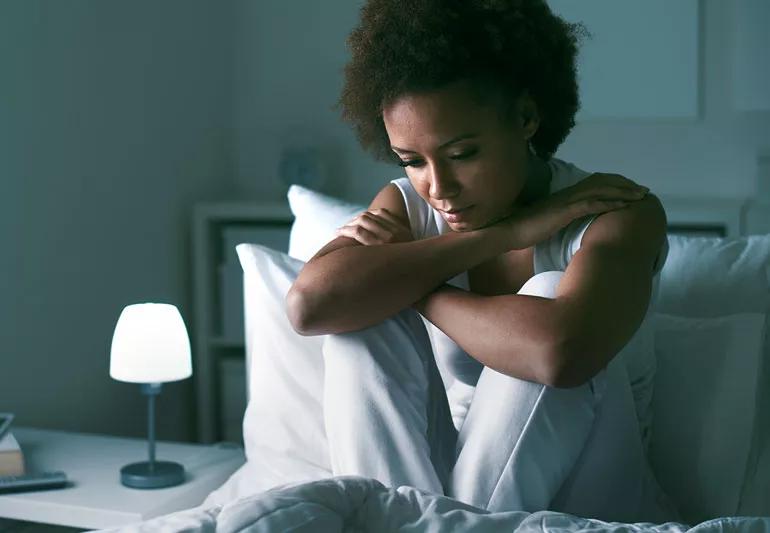How poor sleep harms you — and how to catch more ZZZs

Image content: This image is available to view online.
View image online (https://assets.clevelandclinic.org/transform/21a1f999-84f4-4b19-a4cb-d6ca1395e99d/wmnBadSleep-1329518599-770x533-1_jpg)
woman can't sleep at night
You know that sleep is a pillar of good health, along with a nutritious diet and regular activity. Not getting the recommended seven to nine hours of slumber a night can contribute to a host of health problems, from higher blood pressure to an increased risk of obesity.
Advertisement
Cleveland Clinic is a non-profit academic medical center. Advertising on our site helps support our mission. We do not endorse non-Cleveland Clinic products or services. Policy
But what if your sleep woes happen just occasionally? Can one miserable night of tossing and turning have negative impacts on your health?
Pulmonologist and sleep disorders specialist Samuel Gurevich, MD, explains how a sleepless night affects your mental and physical health — and how to get more shut-eye.
If you were up in the wee hours last night, odds are you’re feeling it today. “Sleep is important because being awake is important,” Dr. Gurevich says. “And one or two nights of bad sleep can impair your ability to function well the next day.”
Too little sleep — even for just one night — can leave you dealing with several unpleasant cognitive effects:
Those effects do more than sour your mood (and make you reach for more coffee). “Paying attention to your surroundings and your reaction time are processes that keep us safe and on task,” Dr. Gurevich says.
When those processes aren’t working as well as they should, it can impair your performance at work or school and even put you at risk of car crashes or other accidents, explains Dr. Gurevich.
Advertisement
When you don’t get enough sleep night after night over the long term, it can lead to all sorts of physical effects — including problems for your heart health.
But even a few missed nights of sleep can take a physical toll on your body, Dr. Gurevich says. “Lack of sleep causes an increase in stress hormones,” he explains. “That triggers your resting heart rate and blood pressure to increase.”
Those changes aren’t usually worrisome if they happen occasionally. “The body and brain recuperate quite well from one or two sleepless nights,” says Dr. Gurevich. “But if it stretches into a month or more, that can have lasting impacts on your heart health, mental health and cognitive abilities.”
Sleep isn’t just idle time. Many important body processes are happening while you snooze. A good night’s rest benefits your health and well-being in some important ways:
Sleeping helps to lock memories into your brain. When you’re sleep-deprived, you’re less able to remember things you learned while you were awake. Sleep also helps your brain regulate emotions. That’s why you might feel irritable and moody after a poor night’s rest.
While you sleep, your body is hard at work repairing itself by releasing proteins and hormones that help restore damaged tissues, including muscles. If you’re sleep-deprived, your body heals more slowly. This tissue repair process is also important for helping athletes build muscle and recover from a workout.
Sleep helps boost your body’s ability to fight illness. During slumber, the body produces cytokines — proteins that direct immune cells to fight inflammation throughout the body.
Researchers have also found that sleep deprivation increases your body’s production of white blood cells, the same response the body shows when exposed to significant stress. That imbalance in your immune system is associated with illnesses such as heart disease.
You want to sleep well and get the amount of sleep you need. So why isn’t your brain cooperating? Unfortunately, falling asleep and staying asleep doesn’t always come easily. Dr. Gurevich offers these tips for natural sleep remedies.
Advertisement
“It takes some time to learn these skills,” says Dr. Gurevich, “but it pays dividends over your lifetime.”
Advertisement

Delivered every Tuesday!
Sign up for our Health Essentials emails for expert guidance on nutrition, fitness, sleep, skin care and more.
Learn more about our editorial process.
Advertisement
Rest up, but make sure you don’t oversleep — it can be as bad for you as undersleeping
Blood pressure naturally dips when we sleep — and that dipping is crucial for a healthy heart
You’ll experience side effects of sleep deprivation within the first 24 hours
High stress and forgetfulness are just two of the symptoms of losing sleep
A sleep expert weighs in on this potentially dangerous but common condition
What you can do to minimize shift work sleep disorder
Difficulty staying asleep at night or sleeping too much during the day are common issues
Look for a firmer mattress and then make adjustments as needed
Type 2 diabetes isn’t inevitable with these dietary changes
Applying a hot or cold compress can help with pain
Pump up your iron intake with foods like tuna, tofu and turkey